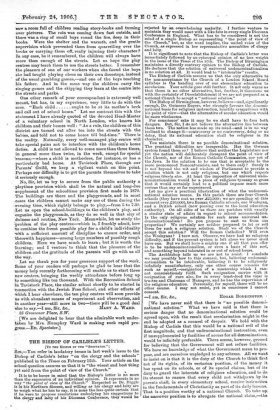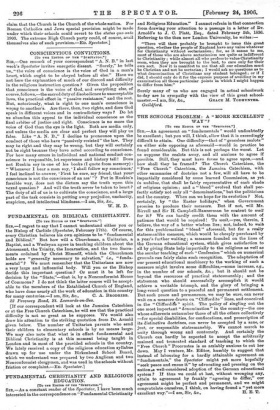THE BISHOP OF CARLISLE'S LETTER.
[To THE EDITOR OT THE " SPECTATOIL." J
Sin,—You refer in laudatory terms in last week's issue to the Bishop of Carlisle's letter "on the clergy and the schools" published in the Times on February 12th. Your article on the school question assures us that it is "the wisest and best thing yet said from the point of view of the Church."
It is to be borne in mind that the Bishop's letter is no more than the expression of an individual opinion. It represents in no way "the point of view of the Church." Respected as Dr. Diggle is in his Northern diocese, and willing as his clergy and laity are to weigh what he has to say, it is none the less quite certain that if he were to propose resolutions embodying his suggestions to the clergy and laity of his Diocesan Conference, they would be rejected by an overwhelming majority. I further venture to maintain they would meet with a like fate in every single Diocesan Conference in England. What has to be considered is not the mind of a single Bishop as representing "the point of view of the Church." but, as the word implies, the united voice of the Church, as expressed in her representative assemblies of clergy and laity.
It is significant to note that the Bishop of Carlisle's letter was immediately followed by an episcopal opinion of no less weight in the issue of the Times of the 16th. The Bishop of Birmingham maintains a directly contrary opinion to the Bishop of Carlisle. He declares that the solution of universal undenominationalism is no solution at all. It would lead to "intolerable" results.
The Bishop of Carlisle assures us that the only alternati■re to the non-acceptance by the Church of a London School. Board syllabus is the handing over of our elementary education to secularism. Your article goes still further. It not only warns us that there is no other alternative, but, further, it threatens us with the certainty of Disestablishment if we are not prepared aa a national Church to accept a "national solution."
The Bishop of Birmingham, however, believes—and, significantly enough, Dr. Guinness Rogers, who strongly favours the denomi- national basis for religions instruction, heartily sympathises with his point of view—that the alternative of secular education Would be more wholesome.
For conscience' sake it may be we shall have to face both dangers. But, Sir, I do not believe the alternative lies between these two. The nation has made up its mind—and is in no way inclined to change it—controversy or no controversy, delay or no delay, that its national education shall be religious in its character.
You maintain there is no possible denominational solution. The practical difficulties are insuperable. Has the German system found them so ? I believe that neither the Legislature nor yet the nation will deliberately disregard the point of view of the Church, nor of the Roman Catholic Communion, nor yet of the Jews. Is the solution to be one that is acceptable to the more pronounced Nonconformists, and to them only ? Surely it is not beyond the wit and wisdom of Parliament to provide a solution which is not only religious, but one which respects ' religious liberty also. At least the imposition of universal pude- nominationalism would be a piece of religions tyranny so gross that it would certainly lead to a political impasse much more serious than any so far experienced.
Let me give a practical illustration of what the undepomi- national solution means. In this parish there are four Church schools (they have cost us over £25,000; we are spending, at this moment over £10,000), two Roman Catholic schools, one Wesleyan, aud a British school (now passing over to the local education authority). On all sides of us there are parishes with exactly a similar state of affairs in regard to school accommodation. Is the only religious solution for such areas universal un- donominationalismP Do you propose to oust us from em properties? We certainly are neither prepared to let or sell them for such a religious solution. Shall we of the Church accept this solution ? Will the Roman Catholics P Will even the Wesleyans ? I trow not. Observe, we have had no religious difficulty, and if the present system is left alone we never shall have one. But we shall have a mighty one if all that you offer is to be undenominationalism, or even a basis of this sort, and something beyond tolerated in or out of school hours.
The Archbishop tells us we are not to resist. I conclude we may possibly bow to this counsel, but, believing undenomir nationalism to be intolerable, believing it to be religiously infinitely unsatisfactory, only one other course remains for
such as myself—resignation of a mastership which I can- not conscientiously fulfil. Such resignation carries with it
resignation of cure also, for in every trust-deed the vicar is trustee and Chairman of Managers, and be has the supervision of the religious education. Personally, for myself, there will be no other course. I may not resist, yet in conscience I cannot consent.
[We have never said that there is "no possible denomi- national solution." What we have said is that there is serious danger that no denominational solution could be agreed upon, with the result that secularisation might in the end be adopted as a counsel of despair. We hold with the Bishop of Carlisle that this would be a national evil of the first magnitude, and that undenominational instruction, even if unsupplemented by facilities of access for all denominations, would be infinitely preferable. There seems, however, ground for believing that the Government will not refuse facilities. We have no knowledge of what the Government mean to pro- pose, and are ourselves unpledged to any scheme. AU we want to insist on is that it is the duty of the Church to think first not of its rights, of its sectarian position, of the money it has spent on its schools, or of its special claims, but of its duty to guard the interests of religious education, and to do its utmost to ensure that every child not with4rawn by its
parents shall, in every elementary school, receive instruction in the fundamentals of Christianity as part of its daily lessons. That is a position worthy of a national Church. To take up. the narrower position is to abrogate the national claim,—the
claim that the Church is the Church of the whole nation. For Roman Catholics and Jews special provision might be made under which their schools could revert to the status guo ante 1903. The extreme High Church party could, of course, avail themselves also of such provision.—En. Spectator.]











































 Previous page
Previous page